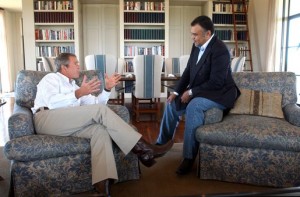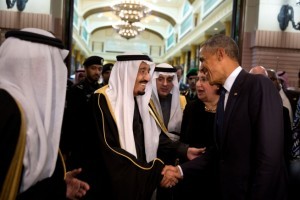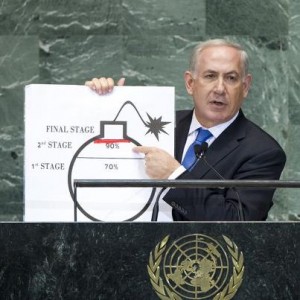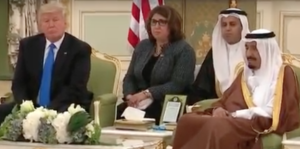Saudis Win Hearts by Lining Pockets
Exclusive: By achieving an odd-couple alliance with Israel, Saudi Arabia has cleared away U.S. political resistance to the massive arms build-up that President Trump just embraced, reports Jonathan Marshall.
(This is the fourth in a series on foreign lobbying.)
Families of the victims and survivors of the 9/11 terrorist attacks have asked the Department of Justice to open “an immediate national security investigation” into a “massive Saudi-funded foreign agent offensive” to “delude Congress” into “shield[ing] the Kingdom from any inquiry into the involvement of its agents in supporting the September 11th attacks.”

Prince Bandar bin Sultan, then Saudi ambassador to the United States, meeting with President George W. Bush in Crawford, Texas, on Aug. 27, 2002. (White House photo)
The complaint marks what is perhaps the most frontal public assault on Saudi influence peddling in Washington since 1981, when pro-Israel critics blasted Riyadh’s successful campaign to win congressional approval for its controversial purchase of AWACS surveillance planes.
The families’ complaint targets Saudi Arabia’s lavishly funded attempts to water down the Justice Against Sponsors of Terrorism Act (JASTA). Passed into law last fall, against opposition from the Obama administration, the act gives Americans the right to sue foreign governments that provide “material support” to terrorist groups.
The complaint asserts that after the law passed, “the Kingdom went on a foreign agent spending spree, hiring . . . more than 100 foreign agents to work on its behalf to wage an assault on JASTA. No expense has been spared in the Kingdom’s unparalleled campaign to build a state of the art and nationwide lobbying and propaganda apparatus for the sole purpose of bending U.S. legislative process to its will.”
It also claims that Saudi Arabia and its lobbyists have potentially committed “widespread criminal violations of the Foreign Agents Registration Act” by, among other things, concealing their role in mobilizing veterans under false pretenses to back repeal of the law.
According to The Hill, the Saudi government now employs 14 lobbying firms, at an estimated cost of well over $1.3 million a month, more than it spent in all of 2000. Their hired guns include Podesta Group, co-founded by Tony Podesta, one of the Democratic Party’s top fundraisers, and his brother John Podesta, who was Hillary Clinton’s national campaign chairman in 2016; BGR Group, whose name partners include the former head of the Republican Party; and former Senate Majority Leader Trent Lott, R-Mississippi.
Besides supporting specific legislative goals like rolling back JASTA, Saudi Arabia cultivates allies in Washington to “keep the focus on what a great ally it is in the Middle East, not on issues like what women are and aren’t allowed to do there,” said a spokeswoman the Center for Responsive Politics in Washington, D.C.
Saudi Arabia’s agents go to great lengths to play down the country’s human rights abuses, including its many beheadings and cruel floggings of dissidents. According to Lee Fang,
“When Nimr al-Nimr, a peaceful government critic, was executed in January (2016), the Podesta Group helped the regime shape media coverage, providing a quote to the New York Times to smear Nimr as a ‘terrorist.’ Other American consultants working for the Saudi Embassy used social media and other efforts to attack Nimr and justify the execution. . . .
“The influence also extends to promotion of Saudi Arabia’s controversial role in the Middle East, including the Saudi-led invasion of Yemen and the country’s failure to address private financiers of radical Islamic groups such as ISIS.”
Taking Care of Friends
Saudi Arabia manages to exert influence, particularly over the Executive Branch, for a number of economic and geopolitical reasons apart from lobbying. No president can afford to overlook its immense importance as a market for U.S. arms makers or its ability to influence the world price of oil.

Saudi King Salman bids farewell to President Barack Obama at Erga Palace after a state visit to Saudi Arabia on Jan. 27, 2015. (Official White House Photo by Pete Souza)
Successive administrations have curried favor with the monarchy to reward its conservative influence in a region that has long been rocked by fiery ideologues like Nasser, Arafat and Khomeini. Saudi Arabia is also valued as an ally in other regions, for example its off-the-books financial support for the Afghan mujahedeen and Nicaraguan Contras in the 1980s.
More recently, Saudi Arabia has won strong support from the Obama and Trump administrations for organizing a coalition of Sunni Arab states to oppose the expansion of Iran’s influence in the Middle East. In the name of containing Iran, Washington has kept quiet about Saudi responsibility for killing thousands of civilians in Yemen, and putting millions there at risk of starvation.
In its quest for influence, however, Saudi Arabia takes no chances and spares no expense. Since the 1940s, when their country became an oil superpower, the Saudis have handed out vast sums of cash on a bipartisan basis to powerful and soon-to-be powerful Americans.
When Arkansas Governor Bill Clinton was nominated for president in 1992, Saudi business tycoons donated $3.5 million to endow the King Fahd Center for Middle East and Islamic Studies at the University of Arkansas. That November, the King of Saudi Arabia called to congratulate President-elect Clinton — and gave another $20 million to the university.
Years later, as Hillary Clinton was mulling her future campaign for president, the Saudi kingdom donated more than $10 million to the Clinton Foundation. Kuwait and other Gulf interests chipped in many millions on top, no doubt solely because of their shared commitment to fighting AIDS.
Republicans have fared even better. Rich Saudis close to the royal family reportedly invested $80 million in Carlyle Group, the world’s largest private equity firm, after it hired former President H. W. Bush and former Secretary of State James Baker as senior advisers.
Earlier, a billionaire Saudi banker raised eyebrows by rescuing Harken Energy after it appointed George W. Bush to its board of directors. Deals like these made the relationship between the Bush family and the royal family almost legendary, particularly after George W. Bush turned a blind eye to Saudi Arabia’s support for radical Islamists, even after 9/11.
The Bushes and the Clintons were far from unique. In the words of former CIA officer Robert Baer, “finding a high-ranking former U.S. government official who isn’t at least tangentially bound to Saudi Arabia is like searching for a teetotaler at a Phi Gam toga party. . . . Aware that government bureaucrats can’t retire comfortably on a federal pension, the Saudis put out the message: You play the game — keep your mouth shut about the kingdom — and we’ll take care of you, find you a job, fund a chair at a university for you, maybe even present you with a Lexus and a town house in Georgetown.”
One of Saudi Arabia’s most influential ambassadors to the United States, Prince Bandar bin Sultan, reportedly told an associate, “If the reputation . . . builds that the Saudis take care of friends when they leave office, you’d be surprised how much better friends you have who are just coming into office.”
The Arab Lobby vs. the Israel Lobby
Recalling that quote, Alan Dershowitz, the pugnacious Harvard law professor and champion of Israel, once commented, “Yes Virginia, there is a big bad lobby that distorts U.S. foreign policy in the Middle East way out of proportion to its actual support by the American public. . . . But the offending lobby is not AIPAC, which supports Israel, but rather the Arab lobby, which opposes the Jewish state.”

Israeli Prime Minister Benjamin Netanyahu at the United Nations in 2012, drawing his own “red line” on how far he will let Iran go in refining nuclear fuel.
Yet for all its funding, the Saudi (or broader Arab) Lobby doesn’t compare in clout to the Israel Lobby. Its most significant victory — narrowly winning congressional support for Riyadh’s purchase of AWACS surveillance planes in 1981 — was achieved more by lobbying from President Reagan and aerospace contractors than from the desert kingdom’s hired help.
Saudi Arabia’s failure to head off passage of JASTA last year highlights its limited ability to defeat grassroots coalitions that threaten its interests. For all its funding, the pro-Arab lobby has no significant public support in the United States. Arab-Americans are politically much less well organized — or focused on Mideast issues — than their counterparts (including Christian Zionists) in the pro-Israel lobby.
In addition, Americans are much less sympathetic to the Saudi national story of desert Bedouins striking it rich with oil, than to the Israeli story of Holocaust survivors establishing the Middle East’s “only democracy” and making the desert bloom.
However, the old game of comparing the clout of these rival lobbies is no longer relevant. Saudi Arabia and other Gulf states today enjoy relatively strong support from Democratic and Republican legislators alike because they have become de facto allies of Israel, pursuing a common campaign of isolating Iran and destabilizing the Assad regime in Syria.
In October 2013, during the height of the impassioned debate over Iran’s nuclear program, Israeli Prime Minister Netanyahu told the U.N. General Assembly, “The dangers of a nuclear-armed Iran and the emergence of other threats in our region have led many of our Arab neighbors to recognize, finally recognize, that Israel is not their enemy. And this affords us the opportunity to overcome the historic animosities and build new relationships, new friendships, new hopes.”
Reports soon emerged of sub rosa meetings between Israeli security officials and the powerful Saudi princes Bandar bin Sultan and Turki al-Faisal, both former heads of Saudi intelligence and ambassadors to the United States. Such meetings reportedly produced secret strategic agreements between Israel, Saudi Arabia and Egypt, as well as joint propaganda campaigns in the United States.
Israel’s staunch supporters in the United States quickly followed Netanyahu’s lead and applauded Saudi Arabia as a great friend.
Soon after the Prime Minister’s U.N. speech, for instance, journalist Robert Parry observed that “American neocons are rallying to the new Israeli-Saudi alliance by demanding that President Barack Obama engage more aggressively against the two countries’ foes in the Middle East, thus ‘bolstering Israeli and Saudi confidence,’ as the Washington Post’s deputy editorial-page editor Jackson Diehl declared.”
Neoconservatives ranging from Max Boot to the Wall Street Journal’s editorial board hammered away at that theme, publishing a steady stream of articles calling on the United States to join Saudi Arabia and other Gulf states to “stop the new Persian Empire.”

President Trump takes part in ceremony for signing agreement on weapons sales in Saudi Arabia, May 20, 2017. (Screen shot from Whitehouse.gov)
One manifestation of the new alliance is the fact that U.S. arms deliveries to Saudi Arabia soared 280 percent from the five-year period 2005-10 to 2011-16. Such massive arming of Riyadh simply would not have been possible without the support of pro-Israel members of Congress.
Defenders of the Israel and Saudi lobbies will claim that they are not subverting the U.S. political system but rather supporting U.S. national interests by promoting the containment of Iran, which they misleadingly brand the world’s “chief sponsor of terrorism.”
In truth, however, the policies they endorse have little genuine public support and have proven dangerous and fabulously expensive to Americans.
The failure to press for a lasting solution to the plight of Palestinians continues to fuel anti-Americanism in the Middle East and other parts of the world. The destabilization of Syria has produced millions of desperate refugees and provided haven for thousands of hardened Islamist fighters. The war in Yemen, supported by Washington in the name of resisting Iran, has become one of the world’s great humanitarian crises.
The Israeli-Saudi ongoing proxy wars with Iran create obstacles to achieving peaceful settlements in the theaters of America two biggest recent wars, Iraq and Afghanistan. Washington’s silence on the human rights violations of Saudi Arabia and other Gulf states makes a mockery of its universal moral claims. And the failure to squarely address Saudi Arabia’s contributions to the growth of Islamist militancy heightens the insecurity of all nations threatened by misguided jihadists.
Reversing these disastrous policies will require years of continued debate and political organizing. But it will also require public exposure and genuine discussion of the malign influence of foreign money and propaganda on the U.S. political system, not just the current focus on alleged Russian activities.
[This is the fourth in a series on foreign lobbying. The previous installments were “The Open Secret of Foreign Lobbying”; “How China Lobby Shaped America”; and “Israel Pays the Political Piper.” Next: The Turkish Lobby.]
Jonathan Marshall is a regular contributor to ConsortiumNews.com.




Geen opmerkingen:
Een reactie posten